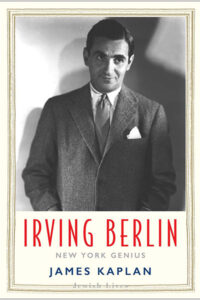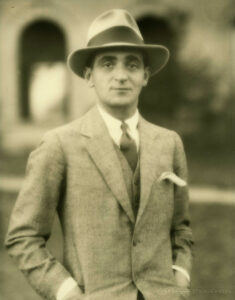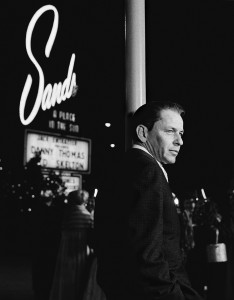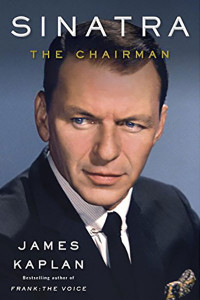Reviews
A fast-moving, musically astute portrait of arguably the greatest composer of American popular music.
Irving Berlin (1888-1989) has been called—by George Gershwin, among others—the greatest songwriter of the golden age of the American popular song. “Berlin has no place in American music,” legendary composer Jerome Kern wrote, “he is American music.” In a career that spanned an astonishing nine decades, Berlin wrote some 1500 tunes, including “Alexander’s Ragtime Band,” “God Bless America,” “White Christmas,” and on and on. From ragtime to the rock era, Berlin’s work has endured in the very fiber of American national identity.
Exploring the intertwining of Berlin’s life with the life of New York City, noted biographer James Kaplan offers a visceral narrative of Berlin as self-made man and witty, wily, tough Jewish immigrant. This fast-paced, musically opinionated biography uncovers Berlin’s unique brilliance as a composer of music and lyrics. Masterfully written and psychologically penetrating, Kaplan’s book underscores Berlin’s continued relevance in American popular culture.
Praise
“James Kaplan’s Irving Berlin is just like its subject: taut, vibrant, and thrumming with the irresistible words and music of America’s songwriter laureate. It’s by turns a buoyant and poignant trip across the tumultuous 20th century, through the eyes of an artist who helped define its popular taste. Kaplan reclaims the proud Jewish identity of the patriotic immigrant who knew that his country was blessed, because he had been.”
—Todd S. Purdum, author of Something Wonderful: Rodgers and Hammerstein’s Broadway Revolution.
From Irving Berlin: New York Genius:
The Ted Snyder Company was, like every other successful publisher on Tin Pan Alley, a mill: a warren of small noisy chambers where not only the house talent, but song-pluggers and postulant composers pounded out would-be euphonies on battered uprights in cacophonous chorus. It would have taken a powerful imagination, not to mention an ironclad will, to conceive fresh musical ideas under such conditions: Berlin had both. One day in the summer or fall of 1910, a ragtime-flavored melody came to him, at work, “right out of the air,” as he recalled a few years later. “I wrote the whole thing in eighteen minutes, surrounded on all sides by roaring pianos and roaring vaudeville actors.” The “thing” — the understatement is nothing short of colossal — was the tune (apparently lyric-less at first) that would become “Alexander’s Ragtime Band.”
By James Kaplan in the LA Times.
(James Kaplan’s most recent biography is the epic 3 Shades of Cool: Miles Davis, John Coltrane, Bill Evens and the Lost Empire of Cool is a deeply researched account of the pinnacle of jazz in the late 1950s. You can read about his Irving Berlin biography here.)
On the morning of Jan. 8, 1940, inveterate night owl Irving Berlin startled the staff in his midtown Manhattan office by bustling in bright and early and announcing to his longtime arranger Helmy Kresa: “I want you to take down a song I wrote over the weekend. Not only is it the best song I ever wrote, it’s the best song anybody ever wrote.” The song was “White Christmas.”
Berlin’s assessment of the tune’s quality may sound inflated, but by the quantitative standard he preferred, he was prescient: “White Christmas” would become the biggest hit among the approximately 1,500 songs he wrote, a monster by any measure. (“The mob is always right,” he was fond of saying.) To date, Bing Crosby’s 1942 recording of the number has sold over 50 million copies, making it the bestselling pop single of all time. The song has been recorded by some 500 artists and in several languages.
What’s the source of its extraordinary power?
“Remarkably insightful…. An alternately triumphant and tragic account of… a life that, as Kaplan concludes, ‘touched almost every aspect of American culture in the twentieth century.’ That’s a big statement, but this big book makes us believe it.” — Bill Ott, Booklist [starred review]
“Riveting…. An appropriately big book for an oversized artistic presence.” — Kirkus Reviews [starred]
“The great singer-actor contains multitudes in this vast, engrossing biography…. Kaplan delves with gusto into Sinatra’s seething contradictions.” — Publishers Weekly [starred]
“This is a great book, make no mistake.” — Craig Fitzgerald, Vermicious
“Hugely compelling… wildly readable… stunningly researched.” — Jeff Simon, Buffalo News
“Fifty pages from the end of Sinatra: The Chairman, the second and concluding volume of James Kaplan’s magisterial biography of Frank Sinatra, I guarantee you’ll begin to weep. Not because you’ve finished a 900-plus-page book (though you will feel relief), or because Kaplan so persistently details the ugly truth about Sinatra…. No, you will weep over the death of a massive and unforgettable talent whose style of living helped define post-war America, and you will weep of an America that no longer exists, whether you lived during those years or just yearn for their return.” — Sibbie O’Sullivan, The Washington Post
“This year marks Sinatra’s centennial, a celebration replete with musical, film, television, and museum tributes. And, of course, books–of which the crowning glory is surely… Sinatra: The Chairman… a riveting read… juicy, painstakingly researched, excitingly written.” — Julia M. Klein, The Boston Globe
“Endlessly engaging…. [Kaplan’s] Sinatra is a magnificent monster…. The music is central… as it should be.” — Edward Kosner, The Wall Street Journal
“Written with… brilliant passion and understanding…. James Kaplan’s two volume set is the definitive word on Frank Sinatra, as definitive as any biography of any public figure can be. It’s jammed with something juicy on almost every page. It has been written with integrity and affection. It neither sugar coats or demonizes.” — Liz Smith, New York Social Diary
“Hugely readable, vastly entertaining, a page turner….” — Adam Gopnik, The New Yorker
James and Alex Gibney discuss Gibney’s 2-part HBO Sinatra documentary in a podcast moderated by Billboard senior editor Frank DiGiacomo: http://www.billboard.com/articles/columns/podcasts/6524133/frank-sinatra-podcast-alex-gibney-james-kaplan-hbo-documentary
Jamie Cullum, Ian Parkinson, and James talk about Billie Holiday’s lasting influence on Frank: http://www.bbc.co.uk/programmes/b05plch3
Doubleday published SINATRA: THE CHAIRMAN, the second and final volume of James Kaplan’s definitive biography of Frank Sinatra, on October 27, 2015.
“Remarkably insightful…. An alternately triumphant and tragic account of… a life that, as Kaplan concludes, ‘touched almost every aspect of American culture in the twentieth century.’ That’s a big statement, but this big book makes us believe it.” — Bill Ott, Booklist [starred review]
“Riveting…. An appropriately big book for an oversized artistic presence.” — Kirkus Reviews [starred]
“The great singer-actor contains multitudes in this vast, engrossing biography…. Kaplan delves with gusto into Sinatra’s seething contradictions.” — Publishers Weekly [starred]
“This is a great book, make no mistake.” — Craig Fitzgerald, Vermicious
“Hugely compelling… wildly readable… stunningly researched.” — Jeff Simon, Buffalo News
“Magisterial…. I guarantee… you will weep…. Stick with it because you’ll learn a lot.” — Sibbie O’Sullivan, The Washington Post
“Endlessly engaging…. [Kaplan’s] Sinatra is a magnificent monster…. The music is central… as it should be.” — Edward Kosner, The Wall Street Journal
“This year marks Sinatra’s centennial, a celebration replete with musical, film, television, and museum tributes. And, of course, books–of which the crowning glory is surely… Sinatra: The Chairman… a riveting read… juicy, painstakingly researched, excitingly written.” – Julia M. Klein, The Boston Globe.
SINATRA: THE CHAIRMAN is now available on Amazon!
The eminent Irish novelist, journalist, and broadcaster Frank Delaney interviews James about Frank: The Voice and Sinatra: The Chairman.
Kaplan on Jeter, New York Magazine, April 7, 1997




